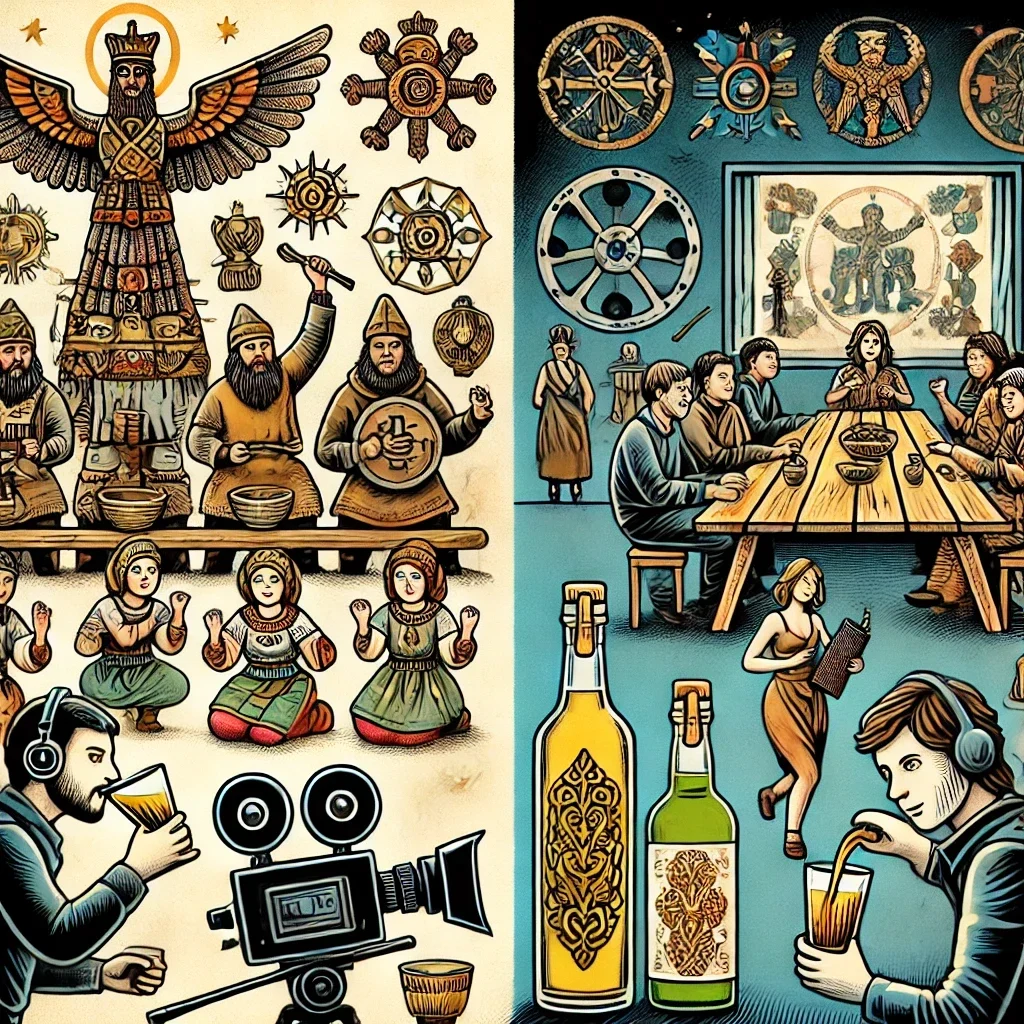In the pantheon of beverages that have achieved cultural immortality, Medovukha often seems like a forgotten relic. While wine, beer, and even mead have secured their place in the annals of pop culture, Medovukha—the honey-based drink cherished by the Slavs for centuries—has remained largely under the radar. But is this fair? Is Medovukha doomed to obscurity, or is there something more profound at play, a deeper connection between this ancient drink and modern culture?
From folklore to modern cinema, Medovukha has quietly persisted as a symbol of tradition, power, and celebration. It has threaded itself through Eastern European history, acting as a marker of both peasant life and aristocratic indulgence. Yet today, Medovukha is being reinterpreted, with appearances in films, literature, and television, though often in subtle, blink-and-you’ll-miss-it ways.
Let us take a journey through time to explore Medovukha’s role in cultural storytelling, from ancient folklore to its rare but notable appearances in modern media. And, along the way, we will raise some questions about why this venerable drink remains so woefully underrepresented outside its homeland.
Medovukha in Folklore: Drink of the Gods and Heroes
To understand Medovukha’s enduring role in modern pop culture, we must first trace its roots to ancient folklore. Across Slavic lands, Medovukha was not just a drink—it was a symbol of the divine. In ancient pagan rituals, honey was considered a sacred gift, and the drink made from it was said to possess magical properties. It was often brewed during festivals to honor the gods, with the belief that it could bestow blessings upon those who drank it.
In Slavic mythology, Medovukha played a role akin to ambrosia in Greek myth. It was not just a libation for mortals, but a drink of the gods and heroes. Legends tell of warriors drinking Medovukha before battle, believing it would grant them strength and courage. In some folk tales, it even appears as a key element in feasts held by Slavic deities. The drink’s intoxicating effects were not only physical but spiritual, offering a way to connect with the divine.
Yet, even as Christianity spread across the Slavic lands, Medovukha retained its cultural importance. It became part of celebrations, weddings, and rites of passage—always present in moments of joy and community. But for centuries, this cultural treasure was confined to the borders of Eastern Europe, with little attention from the broader world. This is where the controversy begins: Why did Medovukha, unlike its counterparts such as mead, never fully break into global consciousness?
The Quiet Presence in Literature: Medovukha as a Symbol
It may surprise some that Medovukha has made occasional appearances in literature, though not with the fanfare of other more globally recognized drinks. Russian and Eastern European authors often infused their works with nods to Medovukha, linking it to rural life and the persistence of tradition.
In Russian literature, Medovukha is often depicted as a rustic, pastoral drink—one consumed in the countryside, far from the trappings of urban sophistication. In many 19th and early 20th-century works, authors like Leo Tolstoy and Fyodor Dostoevsky used references to Medovukha to invoke themes of simplicity and authenticity. When characters drank Medovukha, it symbolized a connection to the land, the people, and a way of life that was quickly being eroded by industrialization and modernization.
In Ukrainian literature, Medovukha often served a different narrative function. Here, it was more closely associated with celebrations—weddings, harvest festivals, and religious holidays. Ukrainian folk poetry and prose often mention the drink as part of community feasts, reinforcing the idea of Medovukha as a shared experience that brought people together.
Yet, outside these works, Medovukha rarely appears in Western literature, which largely ignored the Slavic world’s cultural intricacies. The West’s obsession with mead—the supposed drink of Vikings—left little room for Medovukha. And this omission raises an uncomfortable question: is the global cultural neglect of Medovukha simply a result of geography and history, or is it a reflection of the broader marginalization of Eastern European culture in the West?
Medovukha in Modern Cinema: The Subtle Cameo
Fast forward to the 21st century, and Medovukha has started to make subtle, almost secretive appearances in modern cinema and television. While it still lacks the iconic status of champagne, whiskey, or even sake, Medovukha is no longer absent from the cultural conversation. In fact, in the past decade, Medovukha has quietly slipped into the spotlight in several notable films and series, particularly in Russian and Eastern European productions.
In films like The Irony of Fate and Leviathan, Medovukha is used not merely as a drink, but as a symbolic touchstone for characters’ inner worlds. In The Irony of Fate, a cult classic of Soviet cinema, the drink represents tradition amidst personal and social chaos. Its appearance in the movie is both nostalgic and ironic—hinting at the struggle to maintain cultural identity in a rapidly changing world. Meanwhile, in Leviathan, Medovukha is the drink of choice during moments of solemn reflection and tension, underscoring the gravity of the film’s social and existential themes.
However, perhaps one of the most fascinating recent appearances of Medovukha occurred in the 2021 Netflix series Shadow and Bone, where the drink appeared as a symbol of an ancient, mystical tradition. In this case, Medovukha serves a narrative function, linking the fantastical universe of the show to Slavic folklore. Here, Medovukha acts as a bridge between the mythic past and the modern storytelling tropes of fantasy—a reminder that, even in fiction, the drink carries with it echoes of its storied history.
Yet, even in these cinematic appearances, Medovukha is often a footnote, a background detail, rather than a central feature. It raises the question: why does such an ancient, culturally significant drink still remain so obscure in the global pop culture arena? In a world where alcohol often symbolizes power, luxury, and identity, Medovukha’s relative invisibility is curious, and perhaps telling.
The Missed Opportunity: Why Medovukha Deserves More
If we consider the global landscape of pop culture, it is impossible to ignore the symbolic power that drinks hold. James Bond has his martini. Don Draper has his Old Fashioned. Even Bilbo Baggins has his ale. Alcohol in cinema, literature, and television is not just a beverage—it is an icon, a narrative device that often reveals character traits, historical contexts, or social class.
So why, given its rich history and cultural depth, has Medovukha been left out of this pantheon? The answer might lie in the West’s long-standing oversight of Eastern European contributions to global culture. As a drink so deeply tied to Slavic traditions, Medovukha’s cultural neglect mirrors the broader marginalization of Eastern European history, cuisine, and folklore in the global narrative.
But the tide is changing. With the rise of the craft beverage movement and a growing global interest in rediscovering forgotten traditions, Medovukha may yet find its moment in the sun. Its appearances in modern cinema, though subtle, hint at a growing recognition of its cultural significance. Moreover, as more people seek out authentic, meaningful experiences in food and drink, Medovukha is poised to become a symbol of both tradition and reinvention.
The Future of Medovukha in Pop Culture: A Drink Reclaimed
There is a compelling case to be made that Medovukha deserves more attention in modern pop culture. As global audiences become more aware of and interested in the diverse traditions of Eastern Europe, Medovukha has the potential to rise alongside other iconic beverages, not just as a drink, but as a symbol of a culture that has too often been overlooked.
Whether through its appearances in films, its resurgence in literature, or its growing role in the craft beverage world, Medovukha’s story is far from over. In fact, it may be just beginning. As the drink of Slavic gods and heroes, Medovukha has long been a symbol of power, celebration, and tradition. Now, it is time for the world to recognize it as a cultural icon in its own right—one that deserves a place in the global narrative of pop culture.
And so, the next time you watch a film or read a novel with a glass of wine or whiskey in hand, pause for a moment to consider Medovukha—a drink with a history as rich as any, waiting patiently for its turn in the spotlight.
Discover more from K&K Meadery
Subscribe to get the latest posts sent to your email.




